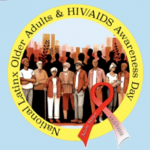A widely used class of medications may increase the risk of recurrent falls and frailty in older people living with HIV, according to a study presented at the Conference on Retroviruses and Opportunistic Infections (CROI 2022).
Anticholinergic drugs block acetylcholine, a neurotransmitter that relays signals from nerves to muscles and organs. This drug class includes prescription and over-the-counter medications used to treat asthma, psychiatric conditions, overactive bladder, gastrointestinal problems, allergies and more. Examples include codeine (used to manage pain and cough) and the commonly used antihistamine Benadryl (diphenhydramine). Well known anticholinergic side effects include dry mouth and eyes, constipation and decreased mental alertness. Other potential adverse effects include cognitive impairment, reduced muscle control and poor coordination. These drugs have been linked to falls and frailty among aging people in the general population, and some experts recommend limiting their use for older individuals.
Jessica Doctor, MD, of Guy’s and St. Thomas’ Hospital in London, and colleagues looked at the association between use of anticholinergic drugs and falls and frailty among HIV-positive people older than 50. The analysis included 699 participants from the POPPY study, a large study of clinical outcomes among older people living with HIV in England and Ireland. Most were white men, with a median age was 57 years. Almost all were on antiretroviral therapy, and about 90% had an undetectable viral load and an adequate CD4 count (above 350 cells).
Within this study population, 193 people (27%) reported using medications with anticholinergic effects, including 64 (9%) who took two or more such drugs. The most frequently used were codeine, citalopram (Celexa and generics, for depression), loperamide (for diarrhea) and amitriptyline (Elavil and generics, for depression), used by 7% to 12% of participants. People who used anticholinergics had more comorbidities, took more total medications, were more likely to use recreational drugs and were more likely to have depression.
Overall, 9% of the study population reported recurrent falls (at least two in the past month), and 21% met criteria for frailty (including poor grip strength, slow walking speed, fatigue exhaustion and reduced activity).
The researchers found that 17% of people who used anticholinergic meds reported having recurrent falls, compared with 6% of those who did not use these drugs. Using two or more anticholinergic increased the odds of falling after adjusting for other factors. Frailty was also more common among anticholinergic users, at 32% versus 17%.
“There is strong evidence for an association between cumulative anticholinergic medication use and recurrent falls, and to a lesser extent frailty,” the researchers concluded. “Clinicians should be alert to this association and reduce anticholinergic medication exposure where possible.”
Click here to read the study abstract.
Click here for more reports from CROI 2022.
Click her for more news about HIV and aging.







2 Comments
2 Comments